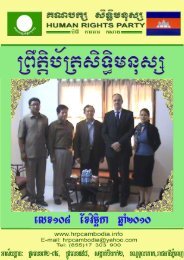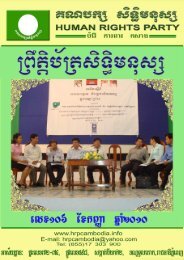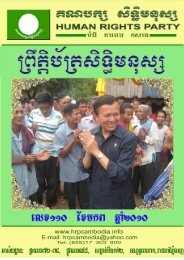Losing Ground - Human Rights Party.
Losing Ground - Human Rights Party.
Losing Ground - Human Rights Party.
You also want an ePaper? Increase the reach of your titles
YUMPU automatically turns print PDFs into web optimized ePapers that Google loves.
<strong>Losing</strong> <strong>Ground</strong><br />
or interest (e.g. roads and gardens, public schools and<br />
hospitals), or areas of archaeological or heritage value.<br />
These cannot be owned or possessed by anyone except the<br />
State. 15<br />
State Private land is “all the land that is neither state<br />
public land, nor legally privately or collectively owned<br />
or possessed under the Land Law of 2001.” 16 Unlike State<br />
Public property, “private property of the state… may be<br />
subject of sale, exchange, distribution or transfer of rights as<br />
it is determined by law.” 17<br />
The “State land” problem<br />
Possession, as already mentioned, must have commenced<br />
before the 2001 Land Law was passed and must meet the<br />
five conditions in order to be legal. The only other limitation<br />
on this is that no possession is legal on State Public property.<br />
As can be seen in the Land Law and Sub-decree on State<br />
Land Management, legally possessed land (that is pre-2001<br />
and meeting the five conditions) is no longer State property,<br />
and is in fact private property.<br />
Land Law 2001, Article 12:<br />
“The State is the owner of the properties in the territory<br />
of the Kingdom of Cambodia enumerated in Article 58 of<br />
the 1993 Constitution and of all properties that are escheat,<br />
or that are voluntarily given to the State by their owners,<br />
or that have not been the subject of due and proper private<br />
appropriation or that are not presently being privately<br />
occupied in accordance with the provisions of<br />
Chapter 4 of this law.” (Emphasis added. Chapter 4 of<br />
the Land Law refers to legal possession. This clearly sets out<br />
that the State is not the owner of legally possessed land.)<br />
Sub-decree on State Land Management, Article 5:<br />
“Private State land is all the land that is neither state<br />
public land, nor legally privately or collectively owned or<br />
possessed under the Land Law of 2001. Private land<br />
of the state includes land that is escheat or land voluntarily<br />
given to the State by the owner or land with no identifiable<br />
legal possessor or owner.” (Emphasis added.)<br />
Unfortunately, there is no coordinated identification,<br />
mapping and registration of State land. As yet there is no clear<br />
delineation of what is State Public land. In practice, observers<br />
see that people are denied recognition of their possessory<br />
rights (and therefore denied access to land title) because<br />
they live on “State land.” The government rarely distinguishes<br />
between the two types of State land. As explained above,<br />
the only grounds for denying the legal possession rights of<br />
the occupier would be if the land was State Public. This is<br />
unverifiable as there is no public information on what is and<br />
what is not State public property.<br />
Without any publicly available records of what is State<br />
public property, as required by the Sub-decree on State Land<br />
Management, it is almost impossible to dispute government<br />
statements that a community is living illegally on State land.<br />
Thousands of Cambodian citizens therefore face a serious<br />
barrier to proper recognition of their legal possession and<br />
the rights that come with it.<br />
Possession without occupation or use<br />
One condition of legal possession is that it must be<br />
continuous. This does not mean owners must physically live<br />
on or even use the land 100 percent of the time. They must,<br />
however, use the land in the natural way that one would be<br />
expected to use that type of land. 18 If someone leaves paddy<br />
field untouched during the peak of the dry season, or leaves<br />
agricultural land fallow for a period, it does not preclude legal<br />
possession. The idea behind the requirement for continuity<br />
of possession was to guard against land speculation.<br />
However, there have been many cases, especially in rural<br />
areas, of individuals coming forward and claiming land,<br />
presenting old documentation indicating possession. This is<br />
often not legal possession for several reasons. Moreover, the<br />
legality of these documents is often questionable.<br />
People living in that area have oftentimes never even seen<br />
the people with the possession certificates – meaning that<br />
the outsider's possession of the land cannot possibly be<br />
continuous, as leaving land empty for years on end is not<br />
a use in line with natural use of the land. Their possession<br />
is also not notorious to the public and is not clear. Article<br />
38 of the Land Law explicitly states that a possessor cannot<br />
“hid[e] himself”.<br />
In this way, many old certificates of possession exist<br />
(perhaps from prior to the 2001 Land Law) but are now<br />
legally invalid and should have no legal standing. Many were<br />
issued without proper process and others have become<br />
invalid as the possessor of the certificate has failed to meet<br />
the five conditions set out in the Land Law.<br />
15<br />
Land Law 2001, Article 16.<br />
16<br />
Sub-decree No 118 on State Land Management 2005, Article 5<br />
17<br />
Land Law 2001, Article 17.<br />
18<br />
Land Law 2001, Article 38.<br />
Forced Evictions and Intimidation in Cambodia<br />
67






